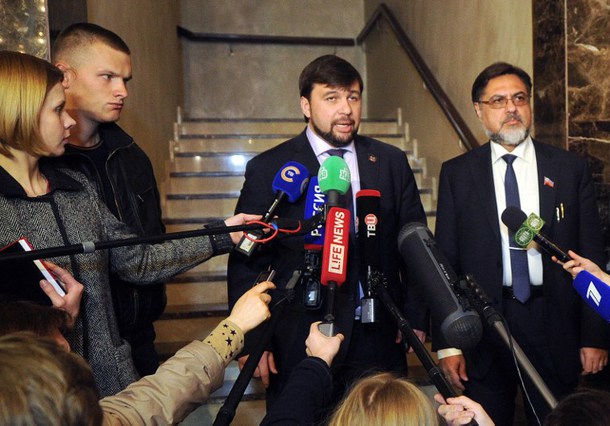
Elections in Ukraine’s Secessionist Territory: A Topic of International Negotiation (Part Two)
Publication: Eurasia Daily Monitor Volume: 12 Issue: 144
By:

To read Part One, please click here.
At this point, Moscow seems content to watch Western diplomats urging Kyiv to legitimize the Donetsk-Luhansk authorities through local elections, and (as a consequence of this) enshrining an official status for that territory in Ukraine’s constitution (see EDM, July 20, 24).
According to Kyiv officials, cited by Zerkalo Nedeli (June 26), US Assistant Secretary of State Victoria Nuland has “gently encouraged Ukraine to include the rebel territories in the upcoming local elections. When reproached politely about such a scenario being unrealistic, Nuland said with a smile: ‘Look for strong characters capable of winning a campaign there.’ Nuland named free access for all media and foreign observers as sufficient conditions for the occupied areas to express their wishes.”
Similarly, German Foreign Affairs Minister Frank-Walter Steinmeier recently urged Kyiv to “go on, hold elections in those territories, change the constitution, and they [Donetsk-Luhansk] will gradually change, too,” according to Ukraine’s chief negotiator, the former president Leonid Kuchma (Zerkalo Nedeli, June 26).
Until mid-July, President Petro Poroshenko and Ukrainian parliamentary leaders resisted such entreaties; they stood firm even when German Chancellor Angela Merkel and French President François Hollande turned their recommendations into outright pressures (see EDM, July 9, 10).
On July 16, however, Nuland prevailed on Kyiv to start the process of enshrining a constitutional status for Donetsk-Luhansk, as well as to hold talks in the Contact Group about local elections in that occupied territory (see EDM, July 20, 24). Nuland held Kyiv strictly to its “obligations” under the Minsk armistice.
The day after Nuland’s agitated visit, Poroshenko assured US Vice President Joseph Biden by telephone about “Ukraine’s undeviating fulfillment of the Mink agreement.” Biden, praising that first constitutional step, urged Ukraine onto the next step: “elections to be held throughout the Donetsk and Luhansk oblasts [provinces]” (Ukrinform, White House press release, July 17).
Also on July 17, the leaders of the “Normandy” group of countries touched on the Donetsk-Luhansk elections in a telephone conference. Russian President Vladimir Putin, Chancellor Merkel, and President Hollande caucused in advance, then surprised Poroshenko with their call while he was visiting the Kryvyy Rih steel plant. Hollande said that all parties should implement their Minsk “obligations” by the end of this year, including local elections in Donetsk-Luhansk. And “the interlocutors agreed with him” (Ukrinform, Elysee.fr, Bundeskanzlerin.de, July 17).
Russia’s Foreign Affairs Minister Sergei Lavrov called his US and German counterparts, John Kerry and Frank-Walter Steinmeier, separately to discuss “Ukraine’s main obligations” at this stage of the Minsk document’s implementation: direct dialogue with Donetsk-Luhansk and local elections to be held there (Interfax, July 18).
On July 20, Poroshenko instructed Kuchma and the other Ukrainian delegates to the Minsk Contact Group to discuss holding elections in Donetsk and Luhansk, merely on the condition that the latter abandon their intentions to hold elections separately from the rest of Ukraine (Ukrinform, July 21). At that point, apparently, Kyiv was still in full retreat.
Meeting on July 21 in Minsk, however, the Contact Group broke down over “DPR-LPR’s” demand that Ukraine adjust its electoral legislation, taking into account “DPR-LPR’s” proposals, which they had submitted in May (see EDM, May 19, 22, 26) as a basis for holding local elections.
In the Minsk meeting, furthermore, Donetsk and Luhansk asked Kyiv to withdraw the constitutional amendment on the status of “certain areas in the Donetsk and Luhansk provinces” from consideration. The Verkhovna Rada (parliament of Ukraine) initiated the approval procedure of that constitutional amendment under Western pressure on July 16 (see EDM, July 20). Donetsk and Luhansk, however, insist that the amendment must be mutually agreed (as distinct from a unilateral Kyiv document), submitted to the Contact Group, and re-submitted in the modified form to the Verhkovna Rada. The “DPR-LPR” delegates in Minsk asked for negotiations with Kyiv about the electoral law and the constitutional amendment (Donetskoye Agentstvo Novostey, Luganskiy Informatsionnyi Tsentr, July 21, 22).
The Organization for Security and Cooperation in Europe’s (OSCE) chairman-in-office, Serbian Foreign Affairs Minister Ivica Dacic, exceptionally attended the Minsk meeting. He declared that “the conditions of holding the elections [in Donetsk-Luhansk], inviting the ODIHR [Office for Democratic Institutions and Human Rights—the OSCE’s election monitoring arm], etc., must be worked out by Kyiv and Donbas [Donetsk-Luhansk] in consensus” (Belta, Ukrinform, Interfax, July 21). And the Donetsk and Luhansk delegates, Denis Pushilin and Vladislav Deynego, went on to declare that their side “strictly adheres” to the Minsk Two document, while Kyiv contravenes it (Interfax, July 24).
A follow-up meeting, tentatively scheduled for July 30, does not seem to have taken place.
The Contact Group’s temporary breakdown may well have contributed to Poroshenko’s recovery of morale on July 29. While visiting Lviv, he declared that the constitutional amendment initiated on July 16 does not envisage any special status for Donetsk-Luhansk, but refers only to Ukraine’s already existing law, adopted unilaterally in September–October 2014, and supplemented with pre-conditions in March 2015. From the “dozen” conditions that must be met before that law goes into effect, Poroshenko cited the evacuation of Russian forces from Ukraine’s territory and the restoration of Ukraine’s sovereign control over its border with Russia. That same law (with its March supplement) also lists democratic election standards as pre-conditions to validating any local elections in Donetsk-Luhansk (Ukraiynska Pravda, July 29).
Russia is regularly citing the Minsk Two document to the effect that Kyiv may not unilaterally adopt decisions on the status of Donetsk-Luhansk and elections there, but only by negotiation with Donetsk-Luhansk authorities. It is a fact that, under the Minsk Two armistice, the constitutional status of Donetsk-Luhansk and the modalities of elections there are supposed to be agreed between Kyiv and the “representatives of those territories” (articles 11 and 12), as distinct from being adopted by Kyiv itself. Western officials will have to remember this, and stop holding Kyiv strictly to the “Minsk obligations,” when Kyiv tries to wiggle out from those Moscow-dictated “obligations.”




